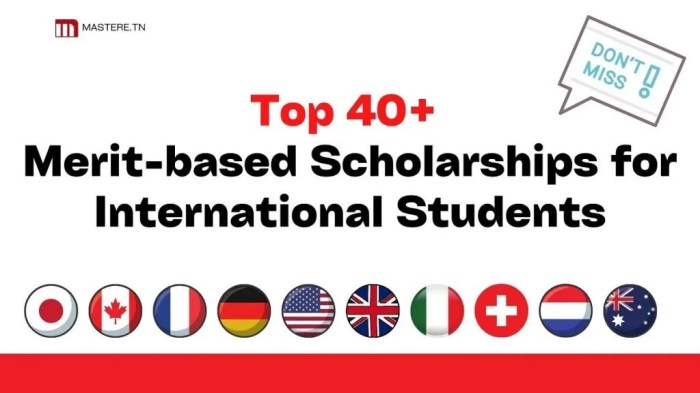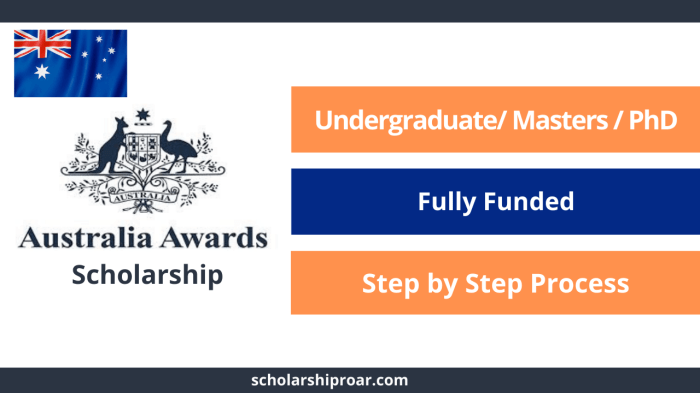Scholarships That Cover Travel Visa and Tuition in Australia
Scholarships That Cover Travel, Visa, and Tuition in Australia – Scholarships That Cover Travel Visa and Tuition in Australia present an exciting opportunity for international students seeking to study in one of the world’s most vibrant educational landscapes. Australia is not just known for its stunning landscapes and diverse culture, but also for its plethora of scholarships that alleviate financial burdens, including travel and visa fees, along with tuition costs.
Whether you’re dreaming of studying in a top university or exploring the unique Australian lifestyle, these scholarships can pave the way for a transformative educational experience.
With a range of options available, from fully funded to partially funded scholarships, understanding the eligibility requirements and application processes is essential. This guide will walk you through everything you need to know to secure financial support for your studies and make your dreams a reality.
Overview of Scholarships in Australia
Australia is a popular destination for international students, not only for its high-quality education but also for the numerous scholarships available to help ease the financial burden. Scholarships can cover various expenses, including tuition fees, living costs, travel, and visa expenses. Understanding the different types of scholarships available can help students make informed decisions about their educational journey in Australia.There are several types of scholarships offered to international students in Australia, including government-funded scholarships, university-specific scholarships, and private scholarships.
Many of these scholarships are designed to attract students from diverse backgrounds and fields of study, ensuring that the educational environment remains vibrant and inclusive. According to recent statistics, Australia provides thousands of scholarships annually, with estimates suggesting that over 10,000 scholarships specifically cover travel, visa, and tuition expenses. This array of options allows students to find financial assistance tailored to their needs and goals.
Types of Scholarships Available for International Students
Understanding the various types of scholarships available is crucial for international students seeking financial support. The scholarships can be categorized as follows:
- Government Scholarships: These scholarships are funded by the Australian government or specific state governments. Examples include the Australia Awards, which aim to promote knowledge, education links, and enduring ties between Australia and its neighbors.
- University Scholarships: Many Australian universities offer their own scholarships to attract talented international students. These can range from merit-based to need-based scholarships, often covering tuition fees and living costs.
- Private Scholarships: Various organizations and foundations offer scholarships to international students. These can be based on specific criteria such as field of study, country of origin, or academic achievement.
Statistics on Scholarships Offered
The significance of scholarships in Australia is underscored by the following statistics, which illustrate the breadth and impact of these financial aids:
- In 2020, it was reported that approximately 58,000 international students received scholarships, emphasizing the commitment of Australian educational institutions to support global education.
- Out of these, around 12,000 scholarships specifically addressed travel, visa, and tuition costs, showcasing the tailored support for international students.
- The Australia Awards alone offered over 3,000 scholarships annually to students from developing countries, promoting educational development and cultural exchange.
Top Universities Providing Comprehensive Scholarships
Several Australian universities stand out for their commitment to supporting international students through comprehensive scholarship programs. These institutions provide a variety of scholarships that not only cover tuition but also assist with living expenses and travel costs.
- The University of Melbourne: Offers the Melbourne International Undergraduate Scholarship, which provides significant tuition fee relief for international students.
- The Australian National University: Provides the ANU Global Diversity Scholarship aimed at attracting talented international students from diverse backgrounds.
- The University of Sydney: Features the Sydney Scholars Award, which rewards academic excellence across various disciplines for international students.
- Monash University: Offers numerous scholarships such as the Monash International Scholarship for Excellence, catering to high-achieving students from around the globe.
“Scholarships in Australia serve as a gateway for international students, ensuring that financial constraints do not hinder their academic aspirations.”
Eligibility Criteria
For students aspiring to study in Australia, scholarships that cover travel, visa, and tuition costs can be a game-changer. Understanding the eligibility criteria is crucial for maximizing the chances of obtaining these financial aids. Each scholarship program may have its distinct requirements, but there are general standards that applicants can expect.The eligibility requirements for scholarships often include a combination of academic achievements, personal statements, and sometimes, specific skill sets or backgrounds.
It is important to note that while basic criteria might overlap, individual programs have their unique specifications that can influence eligibility. Below are some common factors and detailed examples that can enhance an applicant’s profile.
General Eligibility Requirements
Most scholarships in Australia require candidates to meet certain baseline criteria. These factors can include:
- Academic Performance: A consistently high GPA or equivalent can significantly strengthen an application.
- Enrollment Status: Applicants must usually be enrolled in or accepted to a recognized institution in Australia.
- Field of Study: Some scholarships are restricted to specific fields, such as STEM, arts, or business.
- Nationality: Certain scholarships may prioritize international students or those from specific countries.
- Language Proficiency: Proof of English language proficiency, such as IELTS or TOEFL scores, is often required.
Specific Criteria for Various Scholarship Programs
Different scholarship programs may have unique eligibility criteria tailored to their objectives. Here are some examples:
- Commonwealth Scholarships: These scholarships typically require students to demonstrate financial need and may focus on students from disadvantaged backgrounds.
- University-Specific Scholarships: Many universities offer scholarships based on specific criteria, such as leadership roles, community service, or participation in extracurricular activities.
- Research Scholarships: These often require applicants to have prior research experience or a relevant background in their field of study.
Academic Achievements That Enhance Applications
Demonstrating strong academic performance can greatly improve an applicant’s chances of securing a scholarship. Notable achievements may include:
- High Academic Grades: A GPA of 3.5 or higher (or equivalent) is often viewed favorably.
- Awards and Honors: Recognition such as dean’s list, scholarships received in previous academic periods, or subject-specific accolades can add weight to an application.
- Standardized Test Scores: High scores on exams such as the SAT, ACT, or GRE can serve as a testament to an applicant’s capabilities.
- Leadership Roles: Positions held in student organizations, clubs, or community service initiatives showcase initiative and dedication.
Application Process

Source: mastere.tn
Applying for scholarships in Australia is a structured process that generally requires careful planning and adherence to specific guidelines. Understanding the application process helps streamline your efforts and increases your chances of success. Here’s a detailed guide on how to navigate through the application process smoothly.
Steps to Apply for Scholarships in Australia
The scholarship application process involves several key steps that you need to follow meticulously. Each step is crucial for ensuring your application stands out.
- Research Scholarships: Begin by identifying the scholarships that fit your educational goals and financial needs. Look into various universities, government programs, and private organizations.
- Prepare Your Documents: Gather all necessary documents such as transcripts, letters of recommendation, and personal statements.
- Complete the Application Form: Fill out the scholarship application form accurately. Pay attention to detail and follow any specific instructions given.
- Write a Personal Statement: Craft a compelling personal statement that highlights your achievements, motivations, and future goals.
- Submit Your Application: Ensure your application and all documents are submitted by the deadline, following the specified submission guidelines.
- Follow Up: After submission, check the status of your application if the scholarship program allows for it.
Timeline for the Scholarship Application Process
Creating a timeline is essential for managing your tasks effectively. A structured timeline helps you keep track of deadlines and important dates throughout the application process.
| Stage | Timeline |
|---|---|
| Research Scholarships | 3-6 months before application deadlines |
| Gather Documents | 2-4 months before application deadlines |
| Complete Application Form | 1-2 months before application deadlines |
| Write Personal Statement | 3-4 weeks before application deadlines |
| Submit Application | By the scholarship deadline |
| Follow Up | 1-2 weeks after submission |
Checklist of Documents Needed for the Application
Having a comprehensive checklist of required documents is essential for ensuring that your application is complete and meets all criteria.
“A well-prepared application can significantly enhance your chances of receiving a scholarship.”
The following documents are commonly required when applying for scholarships in Australia:
- Academic Transcripts: Official records from your current or previous educational institutions.
- Letters of Recommendation: Strong endorsements from teachers or professionals who can vouch for your qualifications.
- Personal Statement: A document outlining your academic and career goals, achievements, and reasons for applying.
- CV/Resume: A concise summary of your educational background, work experience, and skills.
- Proof of Language Proficiency: For international students, evidence of English language proficiency may be required.
- Financial Documents: If applicable, documents showing your financial status to justify your need for a scholarship.
Types of Funding Covered

Source: scholarshiproar.com
When considering scholarships that cover travel, visa, and tuition in Australia, it’s essential to understand the various types of funding these programs provide. These scholarships can significantly ease the financial burden of studying abroad by covering a range of expenses. From travel costs to tuition fees, the scope of financial support can vary widely. Typically, scholarships may cover several essential expenses associated with studying in Australia.
This includes but is not limited to:
- Tuition Fees: Full or partial tuition costs for the duration of the course.
- Travel Costs: Round-trip airfare to and from Australia, which can be a substantial expense for international students.
- Visa Fees: Costs associated with obtaining a student visa, which is necessary for studying in Australia.
- Accommodation Costs: Provision of housing or stipends to cover living expenses while studying.
- Health Insurance: Coverage for international students under the Overseas Student Health Cover (OSHC), ensuring access to necessary health services.
Fully Funded vs. Partially Funded Scholarships
Understanding the distinction between fully funded and partially funded scholarships is crucial for prospective students. Fully funded scholarships typically cover all the costs listed above, providing a comprehensive financial package that allows students to focus entirely on their studies without worrying about financial constraints. On the other hand, partially funded scholarships provide some financial assistance but do not cover the totality of expenses.
This means students may be responsible for some costs, such as living expenses or a portion of tuition fees.
“Fully funded scholarships eliminate the financial burden, enabling students to immerse themselves in their academic journey.”
Additionally, many scholarships offer extra benefits that enhance the study abroad experience. These benefits may include stipends for living expenses, which can help cover food, travel within Australia, and other everyday costs. Some scholarships also provide funding for academic materials, such as textbooks and equipment, further supporting students in their educational pursuits.
“Scholarships often go beyond tuition, providing a well-rounded support system for students.”
Popular Scholarship Programs

Source: unicrossblog.com
The landscape of scholarships in Australia is rich and diverse, catering to a wide array of international students. Many programs not only cover tuition fees but also provide support for travel and visa expenses, making it easier for students to pursue their academic dreams down under. This section highlights some of the most prominent scholarship programs available to international students, along with inspiring success stories and insights into their competitiveness.
Prominent Scholarship Programs
Several scholarship programs stand out for their comprehensive support and reputation. Understanding these can help prospective students make informed decisions about their applications. Below are some of the notable scholarships:
- Australia Awards: Funded by the Australian government, this scholarship program is aimed at developing countries to promote knowledge, education, and cultural ties. It covers full tuition, travel, and living expenses.
- University of Sydney International Scholarship: This scholarship is awarded to high-achieving international students and covers tuition fees along with a stipend for living expenses.
- Melbourne International Undergraduate Scholarship: The University of Melbourne offers this scholarship to attract top international students, covering part of the tuition fees and providing benefits for living costs.
- Research Training Program (RTP): This program supports both domestic and international students undertaking research in Australia, covering tuition fees and providing a living stipend.
Success Stories of Beneficiaries
Many students have transformed their lives through these scholarship programs, achieving academic and career success that may have otherwise been unattainable. Here are a couple of inspiring success stories:
- Maria Gonzalez: Awarded the Australia Awards, Maria moved from Colombia to pursue a Master’s in Environmental Science. With the scholarship covering her tuition and living costs, she was able to undertake research that led to significant environmental policy changes in her home country.
- James Lee: A recipient of the University of Sydney International Scholarship, James, hailing from South Korea, excelled in his Computer Science degree. He later secured a position at a leading tech company in Australia, attributing his success to the opportunities provided by the scholarship.
Application Competitiveness
The application process for scholarships in Australia can be quite competitive, often requiring a strong academic background and relevant experience. Factors influencing competitiveness include:
- Academic Excellence: Most scholarships prioritize candidates with outstanding academic records, making it essential to maintain high grades.
- Relevant Experience: Many programs look for leadership roles, volunteer work, or internships related to the field of study.
- Quality of Application: A well-crafted personal statement and strong letters of recommendation can significantly enhance an applicant’s prospects.
Tips for a Successful Application
Applying for scholarships can be a competitive process, especially when aspects like travel, visa, and tuition are involved. To stand out, it’s essential to approach your application strategically. This section provides valuable tips to help you craft a compelling application, highlighting the importance of your personal statement, essays, and recommendation letters.
Strategies to Strengthen Scholarship Applications, Scholarships That Cover Travel, Visa, and Tuition in Australia
A strong scholarship application showcases not just your academic achievements, but also your character, goals, and unique experiences. Here are some strategies to enhance your application:
- Research Thoroughly: Understand the scholarship’s objectives, values, and required criteria. Tailor your application to reflect how you align with these elements.
- Be Authentic: Let your personality shine through. Scholarship committees appreciate genuine stories and experiences that illustrate who you are beyond grades.
- Pay Attention to Details: Follow all application guidelines meticulously. Ensure your documents are complete and submitted on time to avoid disqualification.
- Showcase Your Achievements: Highlight not only academic successes but also extracurricular activities, volunteer work, and relevant skills that make you a well-rounded candidate.
Writing Compelling Personal Statements and Essays
The personal statement or essay is your opportunity to communicate directly with the scholarship committee. Crafting a compelling narrative is crucial, and here are some tips to consider:
- Start with a Strong Opening: Engage your reader from the beginning. A unique anecdote or a thought-provoking statement can grab attention right away.
- Structure Your Content: Organize your essay with a clear introduction, body, and conclusion. Make sure each paragraph transitions smoothly to the next, maintaining a logical flow.
- Connect Your Goals with the Scholarship: Clearly articulate how the scholarship will help you achieve your career aspirations and personal development. Show the committee that you have a vision.
- Edit and Revise: After writing your first draft, take the time to revise and refine. Seek feedback from peers or mentors to ensure clarity and impact.
Importance of Recommendation Letters
Recommendation letters can play a significant role in your scholarship application, providing external validation of your abilities and character. Here’s how to secure strong recommendations:
- Choose the Right Recommenders: Select individuals who know you well and can speak to your strengths, achievements, and suitability for the scholarship.
- Provide Context: When requesting a letter, share details about the scholarship and your goals. This will help your recommender tailor their letter to the specific opportunity.
- Give Advance Notice: Request letters well in advance of the deadline. This not only shows respect for their time but also allows them to write a thoughtful recommendation.
- Express Gratitude: After receiving the letter, thank your recommenders. A simple note or email expressing your appreciation can go a long way.
Post-Award Responsibilities
Scholarship recipients in Australia are entrusted with several responsibilities that extend beyond merely receiving financial assistance. Understanding these obligations is crucial for maintaining the scholarship and ensuring a successful academic journey. Adhering to the terms set forth by the scholarship provider not only showcases the recipient’s commitment but also can open doors for future opportunities and networking within the academic community.
Expectations and Responsibilities of Scholarship Recipients
Scholarship recipients are expected to uphold specific standards and responsibilities throughout their scholarship tenure. These expectations serve as a guideline to ensure that recipients make the most of their educational experience while respecting the scholarship’s purpose. Key responsibilities include:
- Academic Performance: Recipients are generally required to maintain a certain grade point average (GPA) or complete a minimum number of credit hours. For instance, a common requirement might be a GPA of 2.5 or higher on a 4.0 scale.
- Regular Reporting: Many scholarships necessitate periodic progress reports to update the scholarship provider on academic achievements, challenges faced, and overall experiences.
- Engagement with the Scholarship Community: Some scholarship programs encourage recipients to participate in community service, networking events, or alumni functions, fostering connections and collaborations.
- Adherence to Visa and Study Regulations: International students must comply with visa conditions, which may include maintaining full-time enrollment and updating the institution about any changes in personal circumstances.
Maintaining Eligibility During the Study Period
To ensure continued eligibility for the scholarship, recipients need to be proactive in managing their academic and personal lives. There are several strategies that can help maintain their status:
- Stay Informed: Regularly review the scholarship guidelines and any communication from the scholarship provider to stay updated on requirements.
- Seek Academic Support: If academic challenges arise, don’t hesitate to reach out to academic advisors or support services available at the institution.
- Time Management: Effectively balancing study, work, and personal life can prevent potential academic setbacks. Utilizing planners or digital tools can help manage time efficiently.
- Networking with Peers: Forming study groups or connecting with fellow scholarship recipients can provide mutual support and shared resources.
Potential for Renewal or Extension of Scholarships
Many scholarship programs offer opportunities for renewal or extension based on academic performance and continued eligibility. This can be particularly beneficial for recipients pursuing postgraduate studies or facing unforeseen circumstances. Factors influencing renewal may include:
- Academic Achievement: Consistently meeting or exceeding the required GPA can lead to automatic renewal.
- Change in Program or Institution: If a recipient wishes to change their field of study or transfer to another institution, they should check if this affects their scholarship status.
- Financial Need: Some scholarships take into account the recipient’s financial situation, allowing for potential adjustments or increases in funding.
Maintaining open communication with the scholarship provider can enhance the chances of renewal and provide clarity on any changing requirements.
Resources and Support
Navigating the world of scholarships can be daunting, but there are numerous resources and support systems in place to aid applicants. Understanding where to find reliable information and assistance can make a significant difference in the scholarship search process. Below, you’ll discover helpful websites, contact details for scholarship offices, and options for mentorship programs that can enhance your application experience.
Scholarship Resources and Websites
A variety of online platforms and organizations offer information about scholarships available in Australia. Here are some essential resources:
- Study in Australia: The official Australian government website provides comprehensive details on studying in Australia, including scholarship information.
- Scholarships.com.au: This site aggregates various scholarships available in Australia, making it easier for students to search based on their needs.
- Go Abroad: An excellent resource for international students, this website Artikels numerous scholarship opportunities, especially those covering travel and tuition.
- Australian Education International (AEI): AEI offers resources for international students, including links to scholarships and funding options.
University Scholarship Offices
Each major Australian university has a dedicated scholarship office, providing personalized support for students. Here are some of the contact details for prominent institutions:
- The University of Melbourne: Email: scholarships@unimelb.edu.au | Phone: +61 3 9035 5511
- The Australian National University: Email: scholarships@anu.edu.au | Phone: +61 2 6125 5111
- The University of Sydney: Email: sydney.scholarships@sydney.edu.au | Phone: +61 2 8627 1444
- The University of Queensland: Email: scholarships@uq.edu.au | Phone: +61 7 3365 1111
Mentorship Programs and Workshops
Participating in mentorship programs and workshops can significantly enhance your scholarship application. These initiatives typically provide personalized guidance and valuable insights into crafting a compelling application.
- Scholarship Mentoring Program: Many universities offer mentorship programs where experienced students or faculty members assist applicants through one-on-one sessions.
- Workshops on Scholarship Applications: Regularly scheduled workshops at universities focus on application writing, interview preparation, and tips for securing funding.
- Online Webinars: Various organizations host free online webinars that address common challenges faced by scholarship applicants and provide expert advice.
Engaging with available resources and support can dramatically improve your chances of securing a scholarship and fulfilling your academic aspirations.
Last Recap
In conclusion, Scholarships That Cover Travel Visa and Tuition in Australia are invaluable resources for aspiring international students. They not only offer financial support but also open doors to enriching educational experiences in a country known for its academic excellence. By understanding the various types of scholarships available and the application process, you can significantly enhance your chances of securing funding and embark on a fulfilling journey of study and exploration in Australia.
FAQ Explained: Scholarships That Cover Travel, Visa, And Tuition In Australia
What types of scholarships are available for international students?
International students can access a variety of scholarships, including government-funded, university-specific, and private scholarships that cover tuition, travel, and visa costs.
How do I apply for these scholarships?
The application process typically involves completing an online form, submitting necessary documents, and meeting specific criteria set by the scholarship providers.
Are there scholarships available for postgraduate students?
Yes, many scholarships cater specifically to postgraduate students, offering funding for tuition, travel, and research expenses.
Can I apply for multiple scholarships at the same time?
Yes, you can apply for multiple scholarships, but ensure you meet the eligibility criteria for each and manage your applications carefully.
What happens if I don’t maintain my scholarship eligibility?
If you fail to maintain eligibility, you may lose your scholarship, so it’s crucial to understand and adhere to the requirements throughout your studies.









